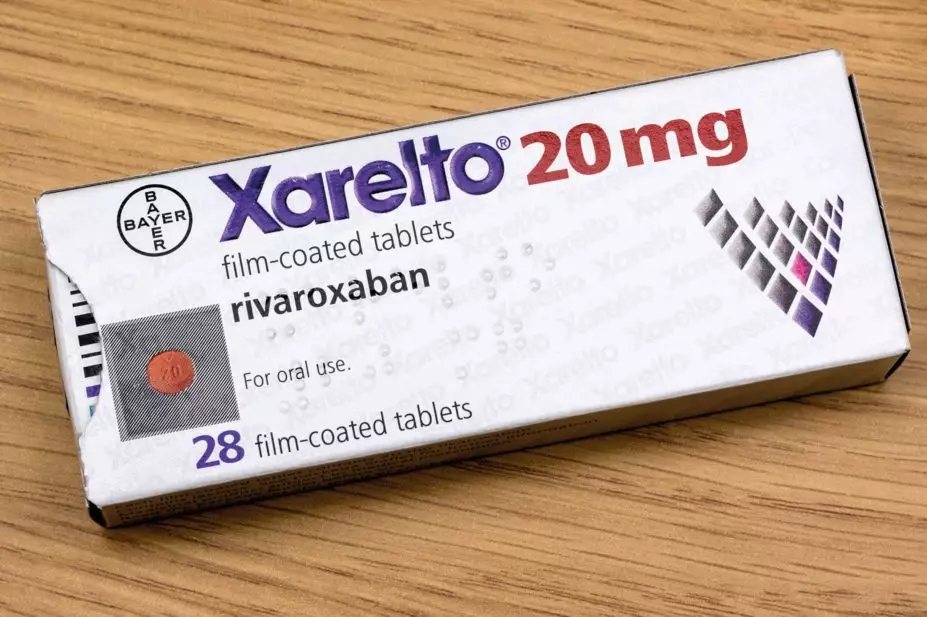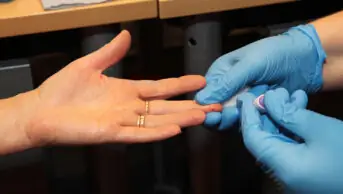
Annie Eagle / Alamy Stock Photo
Rivaroxaban is as safe as aspirin and more effective at preventing recurrent venous thromboembolism (VTE) in patients who were in equipoise for continued anticoagulants, a study shows.
In a Bayer-funded trial of 3,396 patients with venous thromboembolism who were randomised to either once-daily rivaroxaban (20mg or 10mg) or aspirin (100mg) — of whom 3,365 were included for the intention-to-treat analysis — researchers found that those in the latter group had the highest rate of recurrent blood clots (4.4%; 50 events in 1,131 patients).
Blood clot rates in patients taking rivaroxaban were significantly lower — 1.5% (17 events in 1,107 patients) and 1.2% (13 events in 1,127 patients) in those taking 20mg and 10mg, respectively.
The patients had received the drugs for up to 12 months and had already completed 6 to 12 months of anticoagulation therapy previously as treatment for their initial clot and were in equipoise regarding the need for continued anticoagulation.
In terms of major bleeding side effects, there were no significant differences between the treatments: the rates of major bleeding were 0.3% (three patients) in the group taking aspirin, and 0.5% (six patients) and 0.4% (five patients) in the groups taking 20mg and 10mg of rivaroxaban, respectively. The rates of clinically relevant non-major bleeding were 1.8%, 2.7% and 2.0%, respectively.
Philip Wells, head of the department of medicine and senior scientist at the Ottawa Hospital and the University of Ottawa, who presented the findings at the American College of Cardiology’s 66th Annual Scientific Session in Washington DC on 18 March 2017, said that he hoped the study “will convince patients and their physicians to continue life-long medication”.
Only around 40% of venous thromboembolism patients currently take long-term anticoagulation.
However, the study — which was also published in the New England Journal of Medicine
[1]
(online, 18 March 2017) — did have some potential limitations. For example, patients who required extended treatment with therapeutic doses of anticoagulant agents were excluded from the trial, “therefore, it remains unknown whether the 10mg dose of rivaroxaban would be sufficient to prevent recurrence in such patients”, the researchers say.
Principal investigator Jeffrey Weitz, professor of medicine and biochemistry and biomedical sciences at the Michael G DeGroote School of Medicine at McMaster University in Ontario, Canada, adds: “In testing two doses of rivaroxaban, we found that we have the option of lowering the daily dose for extended treatment. This will ease the long-term concerns of both patients and their doctors.”
Commenting on the study, Beverley Hunt, medical director of the charity Thrombosis UK, says: “[The study] has shown that in those needing long-term secondary prevention of VTE where the licensed dose of rivaroxaban is currently 20mg, 10mg was just as effective in reducing recurrent VTE but with a lower bleeding rate, dropping from 3.3% to 2.4% with the lower dose.
“There was also an aspirin arm which had a significantly higher risk of recurrent VTE at 4.4% compared to 1.5% with 20mg rivaroxaban and 1.2% with 10mg rivaroxaban. Thrombosis UK welcomes this fresh information on long term care after VTE.”
Also commenting, Neil Smith, consultant haematologist at Heart of England NHS Foundation Trust in Birmingham, says: “This study demonstrates equivalent protection from recurrence of venous thromboembolism by a 10mg half therapeutic dose of rivaroxaban compared to the standard 20mg anticoagulant dose, with both dosing regimens being superior to aspirin.
This mirrors the results of a similar trial using half dose and full dose apixaban published in 2013.”
References
[1] Weitz J, Lensing A, Prins M et al. Rivaroxaban or aspirin for extended treatment of venous thromboembolism. NEJM 2017. doi: 10.1056/NEJMoa1700518


